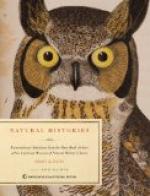Birds can be useful to man in many ways. They can benefit him by carrying the seeds of various plants from place to place so as to assist him in establishing new groves in which to find shelter from the cold in winter and refuge from the heat of the noonday sun in summer. They plant various shrubs by the wayside that spring up and later are laden with luscious fruit. They also carry the spawn of fishes and small crustaceans among their feathers into new waters, and feed upon the countless seeds of weeds that are scattered broadcast over the face of the earth. Some kinds live almost exclusively upon insects, while others hunt out the small rodents that would, if left to themselves, destroy great quantities of grain and other vegetation. Still other birds benefit mankind by acting as scavengers in the removal of putrid and other offensive matter which would endanger our health. In addition to all these varied direct benefits which are brought about by the presence of birds, man is further indebted to these creatures for the cheer which their gay music, bright plumage and pleasant manners bring to him. The birds form a carefully organized army of police which is engaged in keeping affairs balanced in nature.
But we can go even further summing up the benefits that men may derive from the birds. A great many kinds make excellent food, while others furnish sport and pleasure to a large number of men and boys who seem to require a certain kind of entertainment while accompanied with dog and gun. Dead birds when embalmed as mummies and attached to the head-gear worn by some girls and women are also claimed to cause much happiness.
Birds as Enemies.—It would be ridiculous for me to assert here that no injury ever results from the presence of birds on the farm or in the orchard. Quite a number of different species are continually stepping over to the wrong side of the “ledger” as it were, and committing depredations of various kinds which if considered alone would render the perpetrators liable to severe punishment—in some cases even unto death. Some of the crimes that can be charged to the feathered tribe are cherry and berry-stealing, grape-puncturing, apple-pecking, corn-pulling, grain-eating, the unintentional carrying from place to place of some kinds of scale insects that happen to crawl on their legs and feet, the possible spreading of hog cholera by crows and buzzards, the robbing of the poultry yard, and lastly some birds are accused of making noises that awaken us from our slumbers in the morning.
Some of these crimes are genuine and are to be deplored, while others are more imaginary than real. A few of them could be prevented in part or altogether, while others might be diminished if we were inclined to take the trouble to do it.
After all that can be said pro and con concerning the usefulness of birds in general there remains no doubt, in the minds of thinking people at least, as to the value of these creatures. It is only the vicious, biased, and thoughtless persons who continue ruthlessly to destroy birds indiscriminately without first pausing to consider whether or not it is a proper thing to do, whether it is right or wrong.




